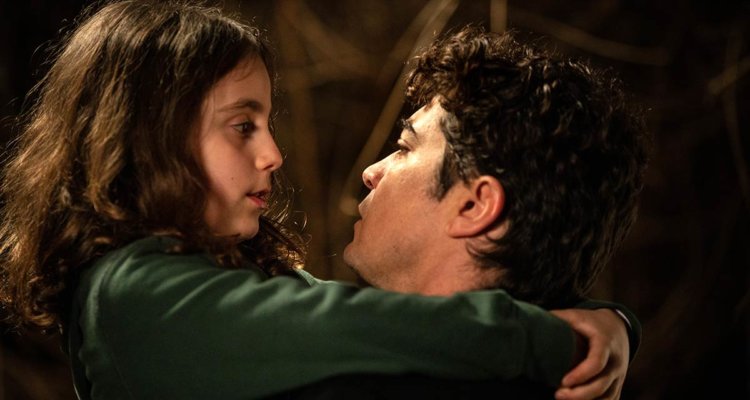Premiering in competition at this year’s Festival de Cannes, Nanni Moretti’s wild melodrama “Three Floors” is based on a 2017 Israeli novel called “Shalosh Qomot” from writer Eshkol Nevo and begins with an undeniably tragic event. One dark night on a quiet street of Rome, a drunk driver runs over a lady crossing the road, narrowly avoids hitting a pregnant woman, then finally crashes into a building, landing straight into a family’s living room. That neither the film itself nor the characters who show up at the scene appear to acknowledge the shocking and mad nature of this sequence of events is an early sign that something is deeply wrong here.
READ MORE: Cannes Film Festival 2021 Preview: 25 Films To Watch
The three floors of the title refer to those of the building in which the car eventually ended its journey. The young man responsible, named Andrea (Alessandro Sperduti), in fact, lives on the top floor with his parents Vittorio (Moretti himself), a judge, and Dora (Margherita Buy), an attorney. That their adult son would show no remorse at all for what he has done is already baffling enough; that his parents would only react with sadness and resigned disappointment to his angry demands that they use their influence to ask the judge for leniency is on another level of irreality. The scene unfolds as though Andrea had merely scratched the family car and was now throwing a tantrum about how it wasn’t his fault and he didn’t deserve to be grounded. The moment when Vittorio finally, calmly remarks “You killed a woman,” stating a fact that shouldn’t need to be stated at all, is only one of the film’s many unintentionally funny instances of failed seriousness.
READ MORE: Summer 2021 Preview: Over 50 Movies To Watch
Madness in its various forms is a clear through-line running across all three of the film’s intermingling stories, but Moretti does not seem to know how to handle that sensitive subject without losing sight of what constitutes normal behavior and what does not. Perhaps the story of Vittorio’s downstairs neighbor Monica (Alba Rohrwacher) comes across as the most credible one precisely because, in her case, the part of irrationality in her life is actually identified and diagnosed as such. Monica is the pregnant woman who was almost run over the night of the accident, yet she does not seem to care or even realize that someone died just a few feet away from where she was standing, no doubt in part because this was also the night when she gave birth to her first child. With her husband still away for work, she is fully absorbed into her new role as a mother, and as she spends long hours alone with her baby, she begins to see things — just like her mother started to lose sight of reality after Monica herself was born.
READ MORE: The 100 Most Anticipated Films Of 2021
The “maddest” of them all, however, remains Riccardo Scarmacio’s Lucio, the ground-floor neighbor, so self-absorbed that he appears to care very little about how or why a car ended up in his living room. Instead, what monopolizes his thoughts is the suspicion that Renato (Paolo Graziosi), the elderly man who sometimes looks after his young daughter, might have acted inappropriately with her. It’s an understandable concern, but one that shifts into the realm of absolute hysteria when Lucio attempts to strangle the nearly senile man in his hospital bed. Things somehow take a turn for the even worse when Lucio, now unable to visit Renato, decides to finally respond to the advances of the older man’s granddaughter, Charlotte (Denise Tantucci), a girl he has known all her life and has never entertained sexual thoughts about before. Although Charlotte always had a crush on him and was the one who undressed for him, she is clearly distraught when Lucio begins to do the same. But the man is so focused on his goal that he either does not notice or does not care.
READ MORE: The 25 Best Films Of 2020 You Didn’t See
Taking a step back from the many odd beats that make up the film’s rich tapestry, one can vaguely identify a method to its madness: “Three Floors” attempts to uncover the darkest impulses in man and to paint a stark picture of a confused world in which people seemingly have little control over what they’re doing. But like most melodramas, this one tends towards ideas of reconciliation and forgiveness, and there too, Moretti stumbles more than once.
Andrea’s mother, Dora, becomes the focus of the first story as she attempts to salvage her relationship with her son while her husband has decided to cut ties with him completely. Likewise, Monica is the heroine of the second tale, trying her best to stay sane and do right by her husband and child. It is therefore particularly jarring and strange that the film would side with Lucio, who is not only a man but also a rapist, in the third story. The twisted and sickening logic here, of course, is that like Dora and Monica, Lucio is most of all concerned about his family; that he was simply worried about his daughter — so worried that he had sex with an underage girl. It seems the Cannes Film Festival attracts ill-judged and reactionary takes on sexual assault and accountability like cars to an Italian living room.
The way out of this paranoia-inducing reality for the three protagonists is long, tortuous, and unconvincing, made up of unlikely chance encounters and requiring a great deal of patience. “Three Floors” indeed appears to reward a sort of passivity that it mistakes for wisdom, though in a world as cursed as this one seems to be, perhaps doing nothing is indeed the best policy. [D]
Follow along with our full Cannes 2021 coverage here.

